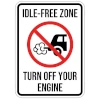 I think leaving a vehicle running, sometimes without the driver in it, while parking in a public place by should be a fineable offence under an anti-idling law. It has become so common now and is especially toxic when the vehicle is a large truck. Would you write about this please?
I think leaving a vehicle running, sometimes without the driver in it, while parking in a public place by should be a fineable offence under an anti-idling law. It has become so common now and is especially toxic when the vehicle is a large truck. Would you write about this please?
Anti-Idling Bylaws
Anti-idling bylaws are designed to provide three benefits: improved air quality, reducing greenhouse gas emissions and fuel savings.
Excessive idling can result in incomplete fuel combustion producing carbon buildup that can damage the engine.
Harmful Emissions
All idling vehicle engines produce carbon dioxide, carbon monoxide, volatile organic compounds, nitrogen oxides and especially in the case of diesels, particulate matter. These are all harmful to our health.
The pollution in exhaust can aggravate asthma and allergies, as well as cardiovascular and respiratory disease. Higher levels of air pollution have been linked to increased school absences, hospital visits, and even premature deaths.
Children are more sensitive to air pollution because they breathe 50 percent more air per pound of body weight than adults.
Vehicle emissions are still present and harmful even when you can't see the exhaust.
Sample Bylaw
A number of municipalities in British Columbia have anti-idling bylaws in place. One example is Kelowna's Idling Control Bylaw No. 12378:
5. GENERAL REGULATION
5.1 An operator or motor vehicle owner must not cause or permit a motor vehicle to idle for more than one minute (60 seconds).
Exceptions
Section 6 of the bylaw describes eight exemptions to the bylaw for things like emergency vehicles, vehicles whose engines also operate equipment on the vehicle and being stuck in traffic.
These exemptions do not apply in a situation where idling is only for the comfort of the occupants at the time.
Learn More
Share This Article
There are a number of reasons why diesel engines are being idled.
The first would be because of the DEF systems now mandatory on all diesel engines after 2007 production years. These systems require burn time that can not be done while driving.
Then there is turbo temperatures that require the circulation of the engine oil for lubrication and cool down requirements.
Next would be the electrical charge rates for multiple battery banks that can take hours to reach full capacity. Most sleeper unit trucks have fridges and food prep appliances that draw a lot of power.
And lastly which is a safety factor for all occupants regarding outside temperatures. Whether hot or cold, there is a fine line between comfort and health safety. Prescription drugs are just one example were people run into body temperature regulation problems.
I always find these kind of topics interesting. Whoever sent you the complaint about idling should maybe consider that being stuck in traffic or just enjoying a summer breeze through their open window while driving easly exposes them to the same levels of harmful gases. They're possibly just not aware that our ability to detect the scent of emissions doesn't smell low concentration levels.
- Log in to post comments
- Log in to post comments

Reasons for Idling